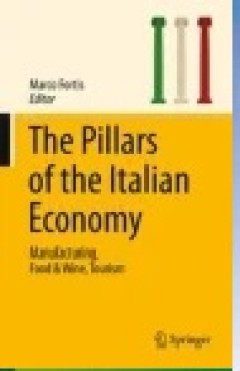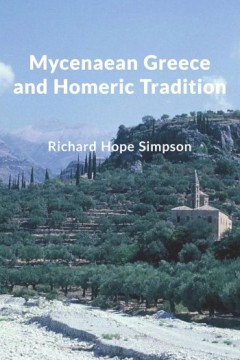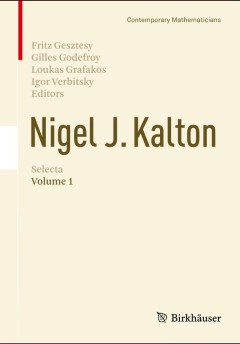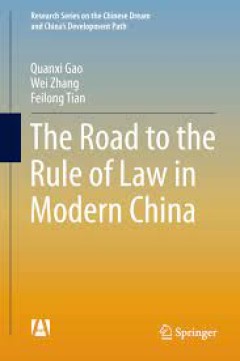Filter by

The Pillars of the Italian Economy
This book offers a detailed analysis of the key sectors in the Italian economy, with the focus especially on areas in which the economy excels, such as the automatic packaging machinery sector, pharmaceutical production, the food and wine industry, and tourism. The book explains how, contrary to widespread opinion, Italy is one of the world’s most competitive countries in foreign trade, as co…
- Edition
- -
- ISBN/ISSN
- 978-3-319-40186-7
- Collation
- XI, 334
- Series Title
- -
- Call Number
- -

The Phenomenological Critique of Mathematisation and the Question of Responsi…
This edited collection discusses phenomenological critiques of formalism and their relevance to the problem of responsibility and the life-world. The book deals with themes of formalization of knowledge in connection to the life-world, the natural world, the history of science and our responsibility for both our epistemic claims and the world in which we live. Readers will discover critiques…
- Edition
- -
- ISBN/ISSN
- 978-3-319-09828-9
- Collation
- X, 223
- Series Title
- Contributions to Phenomenology
- Call Number
- -

The Perfect Shape: Spiral Stories
This book uses the spiral shape as a key to a multitude of strange and seemingly disparate stories about art, nature, science, mathematics, and the human endeavour. In a way, the book is itself organized as a spiral, with almost disconnected chapters circling around and closing in on the common theme. A particular strength of the book is its extremely cross-disciplinary nature - everything is f…
- Edition
- -
- ISBN/ISSN
- 978-3-319-47373-4
- Collation
- XI, 258
- Series Title
- -
- Call Number
- -

Mycenaean Greece and Homeric Tradition
The Author's intention, after over 60 years of study and field work, was to publish his final thoughts on the subject, and make them readily available for all scholars to use, free of cost, wherever they may live. Knowing that his time was limited, and that he would be unable to respond to reviewers' comments, he chose, of necessity, not to submit his manuscript for peer review. It was his wish…
- Edition
- -
- ISBN/ISSN
- -
- Collation
- -
- Series Title
- -
- Call Number
- 390 SIM m

Nigel J. Kalton Selecta
This book is the first part of a two volume anthology comprising a selection of 49 articles that illustrate the depth, breadth and scope of Nigel Kalton’s research. Each article is accompanied by comments from an expert on the respective topic, which serves to situate the article in its proper context, to successfully link past, present and hopefully future developments of the theory, and to …
- Edition
- 1
- ISBN/ISSN
- 978-3-319-18795-2
- Collation
- XIV, 771
- Series Title
- Contemporary Mathematicians
- Call Number
- -

Nigel J. Kalton Selecta Volume 2
This is the second part of a two volume anthology comprising a selection of 49 articles that illustrate the depth, breadth and scope of Nigel Kalton’s research. Each article is accompanied by comments from an expert on the respective topic, which serves to situate the article in its proper context, to successfully link past, present and hopefully future developments of the theory and to help …
- Edition
- 1
- ISBN/ISSN
- 978-3-319-18798-3
- Collation
- XIII, 777
- Series Title
- Contemporary Mathematicians
- Call Number
- -

The Road to the Rule of Law in Modern China
This book is a grand review of the centurial development of rule of law in China. It covers the most important issues in this area and presents “political constitution,” a new interpretative framework that allows the Chinese experience of rule of law to be more fully and correctly expressed. It is especially useful to scholars involved in the study of modern China. The main chapters of this…
- Edition
- -
- ISBN/ISSN
- 978-3-662-45637-8
- Collation
- -
- Series Title
- -
- Call Number
- -

The Road to Universal Logic Festschrift for the 50th Birthday of Jean-Yves B…
This second volume of a collection of papers offers new perspectives and challenges in the study of logic. It is presented in honor of the fiftieth birthday of Jean-Yves Béziau. The papers touch upon a wide range of topics including paraconsistent logic, quantum logic, geometry of oppositions, categorical logic, computational logic, fundamental logic notions (identity, rule, quantification) an…
- Edition
- -
- ISBN/ISSN
- 978-3-319-15368-1
- Collation
- -
- Series Title
- -
- Call Number
- -

The Road to Universal Logic Festschrift for 50th Birthday of Jean-Yves Bézi…
This is the first volume of a collection of papers in honor of the fiftieth birthday of Jean-Yves Béziau. These 25 papers have been written by internationally distinguished logicians, mathematicians, computer scientists, linguists and philosophers, including Arnon Avron, John Corcoran, Wilfrid Hodges, Laurence Horn, Lloyd Humbertsone, Dale Jacquette, David Makinson, Stephen Read, and Jan Wole�…
- Edition
- -
- ISBN/ISSN
- 978-3-319-10193-4
- Collation
- -
- Series Title
- -
- Call Number
- -

New Perspectives on the History of Life Sciences and Agriculture
This volume explores problems in the history of science at the intersection of life sciences and agriculture, from the mid-eighteenth to the mid-twentieth century. Taking a comparative national perspective, the book examines agricultural practices in a broad sense, including the practices and disciplines devoted to land management, forestry, soil science, and the improvement and management of c…
- Edition
- 1
- ISBN/ISSN
- 1385-0180
- Collation
- VII, 509
- Series Title
- Archimedes
- Call Number
- -
 Computer Science, Information & General Works
Computer Science, Information & General Works  Philosophy & Psychology
Philosophy & Psychology  Religion
Religion  Social Sciences
Social Sciences  Language
Language  Pure Science
Pure Science  Applied Sciences
Applied Sciences  Art & Recreation
Art & Recreation  Literature
Literature  History & Geography
History & Geography